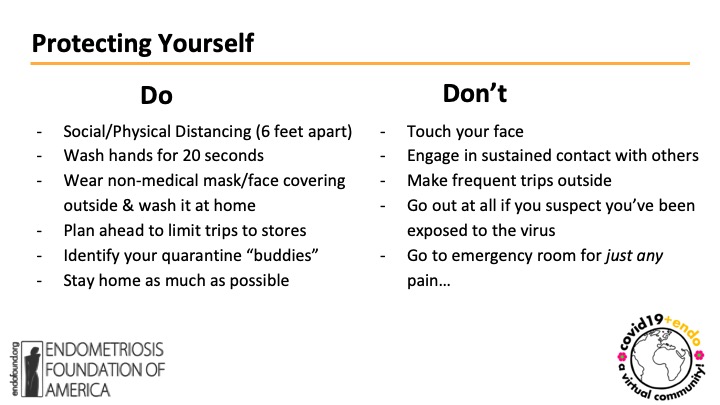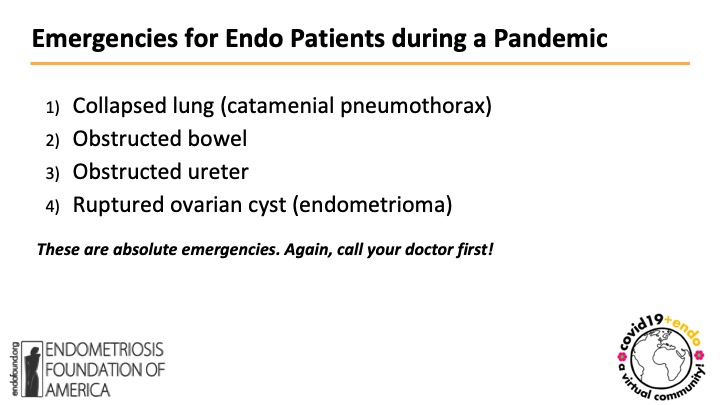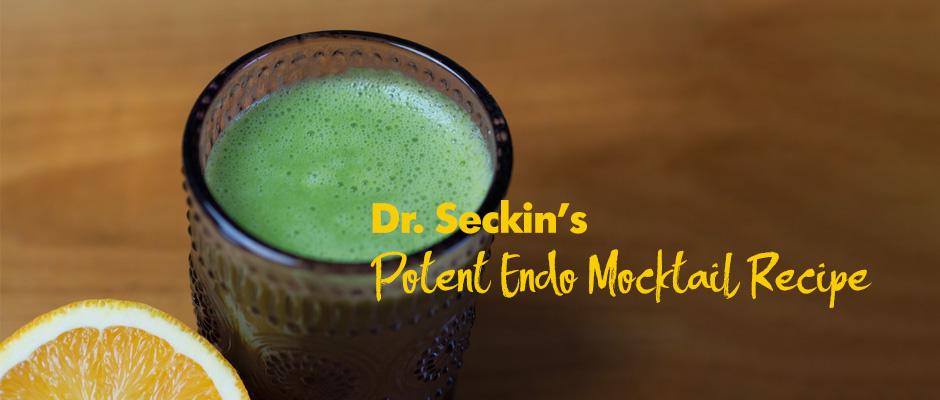
Dr. Seckin answers frequently-asked and urgent questions on COVID-19 & Endometriosis
 On April 5th, 2020, EndoFound CoFounder Dr. Tamer Seckin and journalist and Patient Advocate Sabrina Korber discussed COVID-19 and Endometriosis in EndoFound's first webinar. Dr. Seckin’s responses to the most frequently-asked and urgent questions are printed below. Please visit endofound.org/webinar/endometriosis-covid-19 to watch the full recording.
On April 5th, 2020, EndoFound CoFounder Dr. Tamer Seckin and journalist and Patient Advocate Sabrina Korber discussed COVID-19 and Endometriosis in EndoFound's first webinar. Dr. Seckin’s responses to the most frequently-asked and urgent questions are printed below. Please visit endofound.org/webinar/endometriosis-covid-19 to watch the full recording.
Q: Is endometriosis considered an autoimmune disease? If so, do endo patients need to take extra precautions against COVID-19?
Dr. Seckin: In order to answer this question, we first have to understand what an autoimmune disease is. Simply put, autoimmunity occurs when the immune system attacks the body itself. In the case of endometriosis, displaced tissue similar to the endometrium lining triggers an inflammatory response in the pelvis during the body’s attempt to eradicate the foreign tissue. This can be considered “autoimmune inflammation.” However, in the science of immunology, “immunity” is measured by the presence of antibodies. Antibodies are proteins that specifically recognize an invading pathogen, or virus, bind to it, and eradicate it. In the case of endometriosis, however, we have not yet identified antibodies specific to the disease, and so cannot technically classify it as an autoimmune disease. Though when understood as a diffuse inflammatory disease, endometriosis can diminish the body’s ability to fight illness. Particularly for patients with thoracic endometriosis, who have undergone one or more lung surgeries, COVID-19 can pose a risk. These patients should take extra precautions to limit their risk of exposure to the disease.
Nonetheless, I would like to emphasize that there is no reason for alarm. Endometriosis patients are not necessarily more prone to contracting the COVID-19 virus. At this point, social distancing and sanitizing measures are the best ways to protect yourself and stop the spread of the disease. It’s also a good idea to boost your immunities and increase your vitamin C intake.
Q: Are patients who have been diagnosed with thoracic endometriosis at a higher risk for severe illness from COVID-19?
Dr. Seckin: Patients who have been diagnosed with thoracic endometriosis, either through endoscopy or laparoscopy, should take additional precautions to minimize their risk of exposure to COVID-19. Endometriosis patients who have undergone a lung resection or diaphragm repair can have scarring on the lungs, which leads to reduced blood circulation, fibrosis, and inflammation, resulting in changes to the anatomy of the lungs and diaphragm. Theoretically, these patients are more susceptible to any infection and may be at a higher risk of developing severe illness from COVID-19.


Q: What should I do if my surgery has been postponed?
Dr. Seckin: If your surgery has been postponed due to the COVID-19 crisis, I suggest doing some research on endometriosis in the meantime. Learning more about the type of surgery you will be undergoing, as well as the surgeon who will be performing the operation, is a good start. Online endo support groups are a great resource for connecting with other patients and learning more about the disease and surgery process. It may be a good idea to consider a plan of action should your surgery be postponed until the end of the year. Many providers will be overwhelmed as things return back to normal, and surgeries considered “non-essential” may not resume until later than expected. In the meantime, many doctors are offering telemedicine options, so if you haven’t received a second or third opinion on your case, now might be a good time to do so. Most importantly, establishing a support system of loved ones, friends, and fellow patients is one of the best ways to prepare yourself for surgery and ensure your wellbeing during the post-op recovery period.
Q: What kind of doctor visits should I continue to go to?
Dr. Seckin: At this time, I would suggest postponing any in-person visits and instead consider telemedicine options where available. Until social distancing measures are eased, it is best to remain home and closely monitor your symptoms, notifying your doctor by phone or video conference when necessary. In-person physical therapy sessions and other appointments involving close-contact between you and a doctor or therapist should be avoided.
“Managing Endometriosis During the Coronavirus Crisis: FAQs”
 Everyday Health sat down with Dr. Karli Goldstein to discuss the most common and urgent questions concerning COVID-19 and endometriosis. Dr. Goldstein is an EndoFound board member and Associate Surgeon at the Seckin Endometriosis Center. See below for an excerpt from the article and read the full text here.
Everyday Health sat down with Dr. Karli Goldstein to discuss the most common and urgent questions concerning COVID-19 and endometriosis. Dr. Goldstein is an EndoFound board member and Associate Surgeon at the Seckin Endometriosis Center. See below for an excerpt from the article and read the full text here.
“Everyday Health: My excision surgery was postponed. Will my disease worsen significantly over two to three months? Should I start back on pain meds?
Dr. Goldstein: You should be fine as endometriosis disease doesn’t progress that fast. If you have a chocolate (endometriotic) ovarian cyst, it’s possible it will grow a little bit. If you are concerned about a possible emergency situation, call your doctor.
As for pain, we don’t encourage opioids; they don’t really work and have terrible side effects, such as constipation, increasing pain threshold, and causing bladder dysfunction, which can be troublesome if you have bowel endometriosis and bladder problems. Try ibuprofen or acetaminophen, and use heat packs.”
“Everyday Health: I have endo and I was planning to undergo IVF to get pregnant. Those appointments have been postponed. What can I do to preserve fertility?
Dr. Goldstein: There is some evidence that a low-inflammatory diet is linked to a positive effect on fertility: Eat lots of vegetables and fruit, foods rich in omega-3s, limit red meat unless grass-fed, along with dairy, complex carbohydrates, and processed food. (If you can’t get fresh fruits and veggies, you can use frozen.) Take a multivitamin, vitamin C, and fish oil capsules. As much as possible reduce stress, because it can be harmful to fertility.”
#EverydayEndoChat with Dr. Karli Goldstein and Dr. Michael Nimaroff
Check out Everyday Health’s #EverydayEndoChat on Twitter with Dr. Karli Goldstein, Dr. Michael Nimaroff, and the Society for Women’s Health Research in which they discuss how the coronavirus pandemic will impact ongoing endometriosis treatment. Read Dr. Goldstein and Dr. Nimaroff’s answers below and head over to #EverydayEndoChat on Twitter for the full conversation.
Everyday Health: Is endo considered a disease that makes people immuno-compromised or at high risk for complications from COVID-19?
Dr. Goldstein: There is no data at this point because this is a novel virus meaning it's brand new. Theoretically, having endometriosis shouldn’t increase your risk because even if it is an inflammatory disease, it is not auto-immune in nature. However, patients with pulmonary endometriosis (history of lung collapse, lung resection, cardiothoracic surgery) are likely at higher risk even though, again, we have no data. In any circumstance, I recommend strictly following CDC guidelines: frequent handwashing for 20 seconds, social distancing, work from home if possible, don’t travel!
Dr. Nimaroff: Endometriosis is not considered an immune compromised condition that might put women with the disorder more susceptible to infectious diseases. Certainly, immunocompromised men and women are more prone to developing the severe sequelae of coronavirus infection, women with endometriosis do not appear to be affected any differently than women in the general population. Also, men appear to develop the severe forms of COVID-19 more than twice that of women.
Everyday Health: From a vulnerability perspective, how is endo different from diabetes, heart disease, and other illnesses that put people at risk? What's the difference between inflammation and infection?
Dr. Goldstein: Endometriosis lesions when untreated often have accompanying inflammation around them. It is not infectious in nature. It is not auto-immune meaning there are no known antibodies that are produced as a reaction to endometriosis lesions. Diabetes puts strain on multiple organs and often has comorbidities with kidney insufficiency or high blood pressure or cardiac disease which could put you at higher risk for COVID. Inflammation alone does not, that we know of, cause a higher risk of contracting or having complications from COVID.
Dr. Nimaroff: Endometriosis may be caused by a defect in the immune response to endometrial cells in the pelvic and abdominal cavities and this leads to stimulation of a local inflammatory response which likely plays a role in the sequela of endometriosis. Also, even though patients with endometriosis may be at an increased risk for developing autoimmune disorders endometriosis alone is not a condition that puts women at increased risk for COVID-19. Diabetes, heart disease and other conditions are considered significant co-morbidities for COVID-19 infection likely due to the untoward baseline health status of individuals with these conditions.
An infection is considered an invasion of the body from a microorganism such as a bacteria or virus. Inflammation may be considered the body's immune system’s response to an injury. With COVID-19 the virus infects the body, however, it is the subsequent immune response to the infection that appears to cause the severe effects of the infection.
Everyday Health: In what circumstances should a woman with endo seek emergency care? Are there complications from endo that could warrant a trip to the ER?
Dr. Goldstein: At this time it's best to avoid the ER at all costs unless you have signs of something extremely acute—you are having trouble breathing, high sustained fevers, intractable nausea/vomiting (signs of bowel obstruction), or history of pneumothorax. Severe cases of endometriosis can have lung collapse or bowel obstruction but these are quite rare and generally you would know in advance if you have history or lung collapse with your period or deeply invasive bowel symptoms leading to obstruction. By going to the emergency room at this time for pain, you risk exposure to the virus, and the hospitals are so short-staffed and strained at this point, it is not a good time to go for pain management/imaging. Call your doctor for advice.
Dr. Nimaroff: At the current time women with endometriosis symptoms should avoid using the emergency room if possible (especially in areas of high prevalence of COVID-19) and reach out to their providers if they are in need of guidance, treatment, or evaluation of new symptoms. Certainly, if there is the onset of new debilitating pain, fever, cough with shortness of breath, or signs of possible bowel obstruction a visit to the ER should be considered. However, if possible reach out to your healthcare provider before going to the ER.
Everyday Health: Should women with endo consider going back on the Pill or Orlissa to help manage the disease while surgeries are postponed?
Dr. Goldstein: It may be a good idea to go back on the pill temporarily if that helps you manage pain and disease symptoms until your surgery.
Dr. Nimaroff: As it is still unknown when the health care system will return to normal operations, likely not for another few months, it would be reasonable to continue or begin nonsurgical treatments to alleviate the symptoms of endometriosis. Also, most healthcare systems have been developing triage guidelines for the return of surgical procedures with patients with known or suspected cancer highest on the list.
Everyday Health: Can people with endo still take NSAIDs like Advil? Are there any alternative at-home or OTC remedies you would recommend for treating endo-related pain?
Dr. Goldstein: Yes, you can still take NSAIDs or Tylenol for pain, I recommend alternating them 3 hrs apart staggered when you have severe pain. Epsom salts with a lavender bath can help, as well as heating pads or heat packs.
Dr. Nimaroff: There have been reports that NSAIDS may worsen coronavirus disease, however, this fact has yet to be confirmed and does not make an individual more susceptible to getting the infection. Therefore, NSAIDS may be used if no signs or symptoms of COVID-19 and you are treating your endometriosis pain. Also, acetaminophen does not appear to have any untoward Covid-19 effects. Home remedies can also be tried including heating pads, omega-3 fatty acids, and vitamins (A,C and E). Also, medicinal marijuana has been shown to help patients with chronic pelvic pain.
Everyday Health: What about women with endo who were undergoing or planning to undergo fertility treatments? Can IVF and other procedures be done during the crisis?
Dr. Goldstein: At this time even IVF procedures are suspended according to ASRM guidelines which is the governing body who oversees fertility practices. Fertility doctors are still seeing patients and gathering labs and information in the meantime and doing a lot on telemedicine. This can be a good time to have all of those long conversations/consults and work up and save the cycle for when it's actually safe. I would recommend avoiding any medical procedure at this time until things are safe unless absolutely necessary. Even during the Zika outbreak years ago, you weren't allowed to travel to affected areas and still complete IVF cycles, and this risk was far more remote than contracting COVID. COVID can affect pregnant women causing more severe pneumonia and early delivery even death and can affect the newborn and at this time it's not recommended to take that risk with IVF.
Dr. Nimaroff: During this historic challenge we now face, all non emergent procedures have been cancelled which include IVF and most other fertility treatments. This ban has been recommended by a number of organizations including the American Society of Reproductive Medicine (ASRM). Many programs permitted patients to complete their treatment cycles if previously started by no new cycles should be started at this time.
Everyday Health: Does this pandemic offer any silver linings or benefits for women with endometriosis?
Dr. Goldstein: Hopefully more time for relaxation and self care if you aren’t commuting to work or working reduced hours?!
Dr. Nimaroff: I believe Churchill said, “Never let a good crisis go to waste.” Not sure if there is a benefit specific to endometriosis patients, however, this challenge has given us all time to slow-up and an opportunity to refocus our priorities and examine what is truly important.
Everyday Health: What can women with endo do to boost their immune system and stay healthy during this pandemic?
Dr. Goldstein: Again we don’t have a lot of data yet, but a good multi-vitamin, extra vitamin C, zinc and hydration can't hurt anyone. Healthy diet with fruits and vegetables even if frozen are important!
Dr. Nimaroff: It is extremely important to try and remain calm and to maintain social distancing at all times. However, you need to continue exercise (many using virtual classes) and go for a walk outside daily (wearing a mask). Also, continue to connect with friends and relatives through the many apps available to maintain our need for human connection. Finally, use this “free-time” to read, write, paint, or do things you only dreamed of having enough time to accomplish.
Everyday Health: What can women with endo do to maintain good mental health during this crisis?
Dr. Goldstein: Practice ways to reduce stress at home. Don’t focus on news reports all day long. Nothing is going to happen that quickly that you need to know about every event. Try yoga, meditation and mindfulness. Restorative yoga has the bonus of reducing pelvic pain! Try a lavender bath, take an isolated walk in the fresh air with a mask, exercise in your house, learn a hobby you never had time for before. There's free cooking classes, painting lessons, concerts — all sorts of things. It’s wonderful! Call or FaceTime friends to connect.
Dr. Nimaroff: Obviously continue your healthy diet as before COVID-19. There are reports that Vitamin C helps in COVID-19 patients, but integral to a healthy immune system is diet, regular exercise, adequate sleep, avoid smoking, and alcohol only in moderation.
Everyday Health: Should women with endo pursue telemedicine appointments while in quarantine or lockdown?
Dr. Goldstein: Yes, it’s a great idea! We’re doing more and more of that. I already do phone call consults for long distance patients. I find it allows me to have more time with my patients. I use Zoom, which is HIPAA compliant. Telemedicine can do everything I do in the office except a sonogram and vaginal exam. Then when you can go in for a physical exam, this streamlines the process.
Dr. Nimaroff: This pandemic will certainly change the way health care is delivered for years to come and COVID-19 has brought telemedicine to the forefront for both physicians and patients. I strongly encourage its use to triage if an in-person examination is required at this time. Limiting close contacts is critical to limiting the spread of the virus and this includes health care encounters.
The Endo Mocktail

- Juice 1 grapefruit, 1 orange, and 1 pomegranate
- Toss juice into a blender and add 1 minced clove of garlic, a handful of dill, 2 tsp. of ground turmeric, and fresh (or ground) ginger
- Enjoy!








